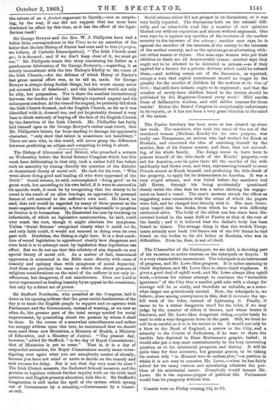The Bishop of Gloucester and Bristol, who preached a sermon
on Wednesday before the Social Science Congress which has this -week been deliberating in that city, took a rather bold line before such an assembly by raising directly the question of the diabolic or demoniacal theory of moral evil. He took for his text, "Who went about doing good and healing all who were oppressed of the Devil." Social science, he said, contemplated doing good' as its great work, but according to his own belief, if it were to succeed in its specific work, it must be by recognizing that the misery to be -cured is the result of an alien bondage, an oppression by personal forces of evil external to the sufferer's own soul. He knew, he said, that evil would be regarded by many of those present as the mere negative force of society, a force as indispensable to progress as friction is to locomotion. He illustrated his case by touching on infanticide, of which no legislative counteraction, he said, could -ever reach the root, though it might alleviate the symptoms. Unless 'Social Science' recognized clearly what it could not do, and only faith could, it would not succeed in doing even its own part well. Doubtless, the Bishop is right here. It is a first condi- tion of sound legislation to apprehend clearly how dangerous and -even fatal it is to attempt more by legislation than legislation can -effect. But we do not see that this sobriety of aim depends on any -special theory of moral evil. As a matter of fact, demoniacal oppression is connected in the Bible more directly with cases of insanity and epilepsy than with symptoms of moral depravity. And those are precisely the cases in which the direct pressure of religious considerations on the mind of the sufferer is not only in- efficacious, but dangerous, if not mischievous. Even our Lord is never represented as healing insanity byan appeal to the conscience, but only by a direct act of power.






























 Previous page
Previous page